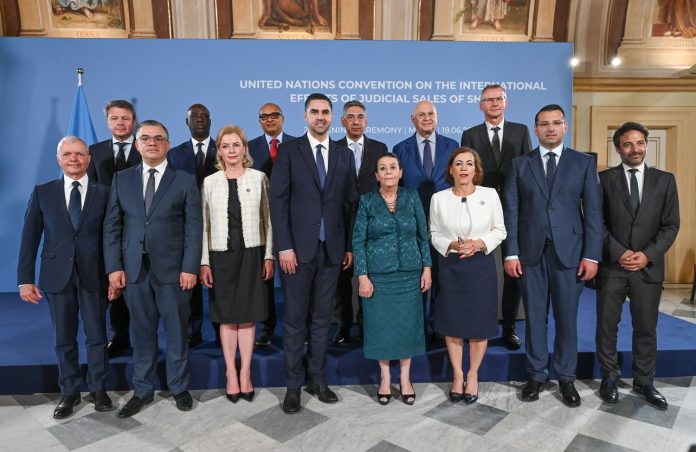Malta and another six countries signed the United Nations (UN) Convention on the International Effects of Judicial Sales of Ships during a special signing ceremony at the Verdala Palace, in Siggiewi, on Wednesday morning.
The signing ceremony, the second of its kind since the Convention was adopted by the UN in 2022, was hosted by the President of Malta Myriam Spiteri Debono, and organised by the Ministry for Foreign and European Affairs and Trade, together with the United Nations and the Comité Maritime International (CMI). The signing ceremony was addressed by the Minister for Foreign and European Affairs and Trade Ian Borg, the Minister for Transport, Infrastructure and Public Works Chris Bonett and the Minister for Justice and Reform of the Construction Sector Jonathan Attard.
Delegations from Antigua & Barbuda, Croatia, Cyprus, Cote d’Ivoire, Italy and Spain were in Malta to sign the Convention during the same ceremony.
The entry into force of the Convention is expected to have considerable improvements in the global shipping sector, as it will enhance legal certainty by creating a uniform regime for the international effects of judicial sales of ships, ensuring that a judicial sale in one State Party will have the effect of conferring clean title on the purchaser in every other State Party, eliminating the risk of having the same ship re-arrested for claims arising from pre-existing rights or interests.
Minister Ian Borg explained that by hosting this signing ceremony, Malta is actively contributing to the entry into force of the Convention, by providing the opportunity for other countries to endorse it. The Convention is being hailed by maritime practitioners worldwide as one of the most important maritime conventions in recent years, providing certainty and stability in an area of international trade responsible for the carriage of 90% of world trade.
“We are living in trying times and facing formidable challenges to the world order. The maritime sector is not immune to these challenges and every concrete step that we can take towards a universal framework that can give greater certainty is more crucial than ever before,” Minister Borg said.
Minister Jonathan Attard noted that “in Malta’s maritime legal tradition, we have a long history of upholding justice and fairness in maritime transactions. As a prominent maritime jurisdiction in the Mediterranean, Malta has accumulated expertise in all aspects of the Maritime Law. Our country has been actively participating and supporting the Convention and now that the pertinent EU process is complete, I look forward to seeing more EU member states adopting it”.
“Since the European Commission will have to adopt another Council Decision enabling Member States to ratify the Convention, Malta is looking forward for our societies and organisations to be able to make use of the advancements therein,” Minister Attard added.
Minister Chris Bonett said that the introduction of the Certificate of Judicial Sale will streamline the process of transferring and registering ships, providing the certainty and uniformity that this industry needs.
“Malta’s economic wellbeing is closely tied to maritime transport with more than 22,000 workers, from dock workers to legal representatives earning a living from this sector, contributing to around 16% of Malta’s GDP. Therefore, strengthening our maritime product will always be a welcome step forward this government will proudly make. Malta signing this international treaty and being even more harmonised with the international community gives us further credentials in an industry we have always been leaders in,” Minister Bonett concluded.
The signing ceremony was also addressed by José Angelo Estrella-Faría from the United Nations Office of Legal Affairs, Ann Fenech, President of the CMI, Richard Sonnenschein from the DG Justice and Consumers of the European Commission and Dorota Lost-Sieminska from the International Maritime Organization. The signing of the Convention was officiated by David Nanopoulos, Chief of the Treaty Section of the United Nations.










